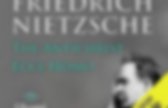

Descartes meditations second philosophy - Google 検索. Mountain Men: On "Hiking with Nietzsche" Again and again a page loosens in the scroll of time, drops out, and flutters away—and suddenly flutters back again into man’s lap.

Then man says “I remember” and envies the animal which immediately forgets and sees each moment really die, sink back into deep night extinguished for ever. — Friedrich Nietzsche, On the Advantage and Disadvantage of History for Life I was a gin-soaked ski bum from farm-field nowhere the year I fell for Nietzsche. Platanis third Iliad - Google 検索.
Nihilism. Nihilism is the belief that all values are baseless and that nothing can be known or communicated.
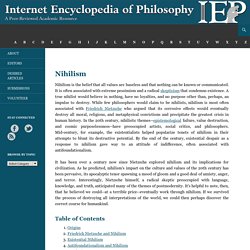
It is often associated with extreme pessimism and a radical skepticism that condemns existence. A true nihilist would believe in nothing, have no loyalties, and no purpose other than, perhaps, an impulse to destroy. While few philosophers would claim to be nihilists, nihilism is most often associated with Friedrich Nietzsche who argued that its corrosive effects would eventually destroy all moral, religious, and metaphysical convictions and precipitate the greatest crisis in human history. Einstein field equations. Field equations in general relativity The Einstein field equations (EFE; also known as Einstein's equations) comprise the set of 10 equations in Albert Einstein's general theory of relativity that describe the fundamental interaction of gravitation as a result of spacetime being curved by mass and energy.[1] First published by Einstein in 1915 as a tensor equation,[2] the EFE relate local spacetime curvature (expressed by the Einstein tensor) with the local energy and momentum within that spacetime (expressed by the stress–energy tensor).
As well as obeying local energy–momentum conservation, the EFE reduce to Newton's law of gravitation where the gravitational field is weak and velocities are much less than the speed of light.[4] Henri Poincaré. French mathematician, physicist, engineer, and philosopher of science Jules Henri Poincaré (,[4] ;[5][6][7] French: [ɑ̃ʁi pwɛ̃kaʁe] ( listen);[8][9] 29 April 1854 – 17 July 1912) was a French mathematician, theoretical physicist, engineer, and philosopher of science.
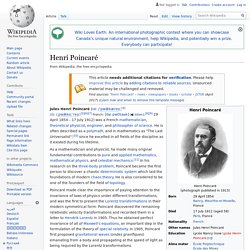
He is often described as a polymath, and in mathematics as "The Last Universalist",[10] since he excelled in all fields of the discipline as it existed during his lifetime. Roger Penrose. Sir Roger Penrose OM FRS (born 8 August 1931) is an English mathematical physicist, mathematician and philosopher of science.
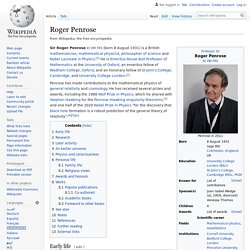
He is Emeritus Rouse Ball Professor of Mathematics at the University of Oxford and an emeritus fellow of Wadham College, Oxford. Penrose has made contributions to the mathematical physics of general relativity and cosmology. Bernard* 1889 freud group psychology. Group Psychology and the Analysis of the Ego. Group Psychology and the Analysis of the Ego (German: Massenpsychologie und Ich-Analyse) is a 1921 book by Sigmund Freud, the founder of psychoanalysis.
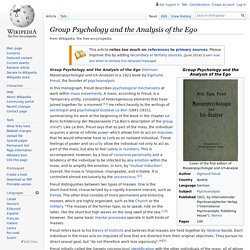
Freud distinguishes between two types of masses. One is the short-lived kind, characterized by a rapidly transient interest, such as trends. The other kind consists of more permanent and enduring masses, which are highly organized, such as the Church or the military. Le bon. Monadology and Sociology Gabriel Tarde. Gabriel Tarde. Gabriel Tarde (French: [taʁd]; in full Jean-Gabriel De Tarde;[2] 12 March 1843 – 13 May 1904) was a French sociologist, criminologist and social psychologist who conceived sociology as based on small psychological interactions among individuals (much as if it were chemistry), the fundamental forces being imitation and innovation.
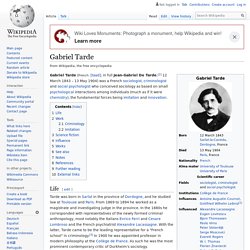
Gustave Le Bon. Charles-Marie Gustave Le Bon (French: [ɡystav lə bɔ̃]; 7 May 1841 – 13 December 1931) was a leading French polymath whose areas of interest included anthropology, psychology, sociology, medicine, invention, and physics.[1][2][3] He is best known for his 1895 work The Crowd: A Study of the Popular Mind, which is considered one of the seminal works of crowd psychology.[4][5] A native of Nogent-le-Rotrou, Le Bon qualified as a doctor of medicine at the University of Paris in 1866.
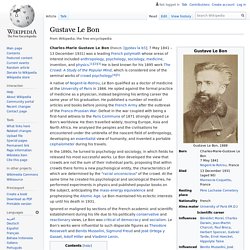
He opted against the formal practice of medicine as a physician, instead beginning his writing career the same year of his graduation. He published a number of medical articles and books before joining the French Army after the outbreak of the Franco-Prussian War. Defeat in the war coupled with being a first-hand witness to the Paris Commune of 1871 strongly shaped Le Bon's worldview. Grentzboten - Google 検索. David Strauss the old and new faith - Google 検索.
The Old Faith & the New - David Friedrich Strauss. Nietzsche contra Wagner. Nietzsche contra Wagner is a critical essay by Friedrich Nietzsche, composed of recycled passages from his past works.

It was written in his last year of lucidity (1888–1889), and published by C. G. Naumann in Leipzig in 1889. Nietzsche describes in this short work why he parted ways with his one-time idol and friend, Richard Wagner. Nietzsche attacks Wagner's views, expressing disappointment and frustration in Wagner's life choices (such as Nietzsche's mistaken belief that Wagner had converted to Christianity, perceived as a sign of weakness).
Thirteen sections[edit] The sections are as follows: Dionysus. Ancient Greek god of winemaking and wine Dionysus or Dionysos[a] is the god of the grape-harvest, winemaking and wine, of fertility, ritual madness, religious ecstasy, and theatre in ancient Greek religion and myth.[2][3] He is also known as Bacchus ( or ; Greek: Βάκχος, Bákkhos), the name adopted by the Romans;[4] the frenzy he induces is bakkheia.
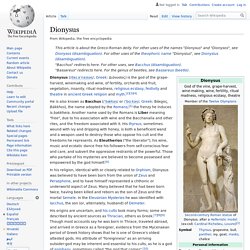
His thyrsus, sometimes wound with ivy and dripping with honey, is both a beneficent wand and a weapon used to destroy those who oppose his cult and the freedoms he represents. Apollonian and Dionysian. Terms representing a dichotomy/dialectic between rationality and emotion The Apollonian and Dionysian is a philosophical and literary concept and dichotomy/dialectic, based on Apollo and Dionysus in Greek mythology.
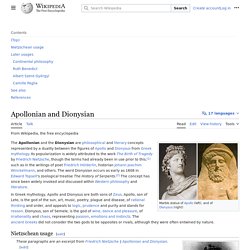
Some Western philosophical and literary figures have invoked this dichotomy in critical and creative works, most notably Friedrich Nietzsche and later followers. In Greek mythology, Apollo and Dionysus are both sons of Zeus. Apollo is the god of the sun, of rational thinking and order, and appeals to logic, prudence and purity. Musical Youth. Musical Youth is a British Jamaican reggae band formed in 1979 in Birmingham, England. They are best remembered for their successful 1982 single "Pass the Dutchie", which became a number 1 hit around the world. The band recorded two studio albums, and released a number of successful singles throughout 1982 and 1983, including a collaboration with Donna Summer.
Musical Youth earned a Grammy Award nomination before disbanding in 1985 after a series of personal problems. The Birth of Tragedy. Book The Birth of Tragedy from the Spirit of Music (German: Die Geburt der Tragödie aus dem Geiste der Musik) is an 1872 work of dramatic theory by the German philosopher Friedrich Nietzsche. It was reissued in 1886 as The Birth of Tragedy, Or: Hellenism and Pessimism (German: Die Geburt der Tragödie, Oder: Griechentum und Pessimismus). The later edition contained a prefatory essay, "An Attempt at Self-Criticism", wherein Nietzsche commented on this earliest book. The book[edit] Nietzsche found in classical Athenian tragedy an art form that transcended the pessimism and nihilism of a fundamentally meaningless world. Thomas Carlyle.
Scottish historian, satirical writer, essayist, philosopher and teacher Thomas Carlyle (4 December 1795 – 5 February 1881) was a Scottish historian, satirical writer, essayist, translator, philosopher, mathematician, and teacher.[1] Considered one of the most important social commentators of his time, he presented many lectures during his lifetime with certain acclaim in the Victorian era.
One of those conferences resulted in his famous work On Heroes, Hero-Worship, and The Heroic in History where he argued that the key role in history lies in the actions of the "Great Man", claiming that "the history of the world is but the biography of great men".[2] A respected historian, his 1837 book The French Revolution: A History was the inspiration for Charles Dickens' 1859 novel A Tale of Two Cities, and remains popular today.
Carlyle's 1836 Sartor Resartus is a notable philosophical novel. Charles Baudelaire. Charles Pierre Baudelaire (French: [ʃaʁl bodlɛʁ]; April 9, 1821 – August 31, 1867) was a French poet who also produced notable work as an essayist, art critic, and pioneering translator of Edgar Allan Poe. His most famous work, Les Fleurs du mal (The Flowers of Evil), expresses the changing nature of beauty in modern, industrializing Paris during the 19th century. Baudelaire's highly original style of prose-poetry influenced a whole generation of poets including Paul Verlaine, Arthur Rimbaud and Stéphane Mallarmé among many others. He is credited with coining the term "modernity" (modernité) to designate the fleeting, ephemeral experience of life in an urban metropolis, and the responsibility art has to capture that experience.[1] Baudelaire the poet[edit] Baudelaire is one of the major innovators in French literature.
Early life[edit] Baudelaire was educated in Lyon, where he boarded. Portrait by Emile Deroy (1820–1846) Published career[edit] The Flowers of Evil[edit] Hans von Bülow. Life and career[edit] Undated portrait of Hans von Bülow Hans Guido von Bülow ca. 1889. Dietrich fischer-dieskau manfred-meditation - Google 検索. Wagner ~ Tannhäuser Overture. Richard Wagner - Lohengrin - Prelude. Richard Wagner - "Tristan und Isolde", Prelude.
Heinrich Heine. Heinrich handle lyrical poet nietzsche. Sedentary lifestyle. “In Vino Veritas” and Other Latin Phrases to Live By. Definition - "if you seek his monument, look around" In vino veritas. Definition of Privado by Merriam-Webster. H. l. mencken. Anthony Ludovici. Oscar Levy. This is common and ludovici. Dr. Theodore hamburger.